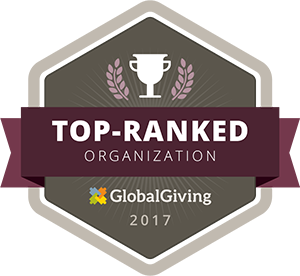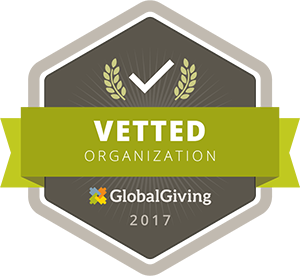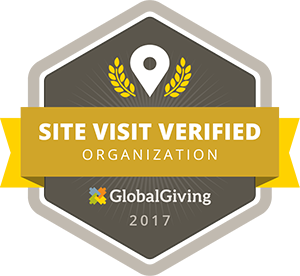History
In 2004, founder Gretchen Steidle went to South Africa to research the HIV/AIDS issue, eager to convince the country's largest corporations to invest in the innovative work of social entrepreneurs combating the disease. She spent a month crisscrossing the country, interviewing social workers, health care workers, NGOs, Ashoka's social entrepreneurs, academics, business leaders, and individuals.
While there, Gretchen met a young woman named Zolecka Ntuli in the Crossroads township outside of Cape Town. They sat together in the extreme heat of her one-room corrugated metal shack. Zolecka told of how she was shocked when a 12-year old neighborhood girl was raped by a group of young boys who thought it was their right to have sex with her because she was their girlfriend. Despite being unemployed, Zolecka started a grassroots support group to combat sexual violence. She bought bread with some loose change and invited 15 women to start a dialogue about the issue of child rape. By the time Gretchen met her six months later, Zolecka and 60 community members - including 15 men - were meeting three times a week to talk about the issue. Zolecka began generating income through beadwork and HIV ribbons, so she could provide some food, often the only meal her members might eat that day. Zolecka put herself through training programs so that she could better educate others and soon she was training both women and men to become educators too. Each step of the way, she evolved her approach.
Zolecka, then just 25 years old, knew what she was meant to do to help her community.
Gretchen learned on that trip that women and girls in grassroots communities throughout the country already knew what they needed to do to protect themselves from contracting HIV. But they did not have the economic freedom, sexual rights, or personal voice to decide when, where, how, and with whom to have sex. Gretchen also learned that the single greatest obstacle in the fight against the spread of HIV was not the lack of corporate investment but a woman's powerlessness - until a woman had the courage to step forward to address the issue head-on, such as Zolecka Ntuli.
Gretchen knew then that she wanted to dedicate her work towards helping emerging change makers within these marginalized populations of women advance their own ideas for social change. Shortly after her journey to South Africa, she founded Global Grassroots to provide training, funding, and advisory support for grassroots change agents, like Zolecka Ntuli, working to advance social justice for the world's most vulnerable women and girls.
At the same time in 2004 that Gretchen was sitting with Zolecka Ntuli, her brother, a former US Marine Captain named Brian Steidle, left the US to begin work as a military observer in Sudan. Over the next 12 months, he shared with her via email and satellite phone, his firsthand accounts of the Darfur crisis as he went out each day, unarmed, to visit bombed out villages and take testimonies from women who had been gang-raped and whose husbands had been executed.
Since early 2003, Government of Sudan soldiers and its unofficially-backed "Janjaweed" Arab nomad militias have carried out a campaign of terror against Darfur's non-Arab tribes. Experts estimate at least 400,000 have been killed, approximately 2.5 million have been displaced within Darfur, and hundreds of thousands of others have crossed the desert to arrive safely in Chad. To date, peace has yet to be achieved.
Gretchen was deeply affected by the sexual violence she learned was taking place in Darfur. Doctors Without Borders estimates that 82% of rapes, predominately gang rapes, occur during daily chores – when women venture into the desert away from the camps or villages to collect water or firewood. These women risk rape daily to avoid starvation. The stigma surrounding rape is so significant that women are frequently abandoned by their husbands or families with shame because they are considered "tainted" and "unmarriageable", arrested for illegal pregnancies under Sudan's law, forced to undergo virginity testing, and later exploited further in captivity.
Upon her brother's return from Darfur, Gretchen worked to help expose his story and photographs to the media, including The New York Times, U.S. Congress and national advocacy groups. When the media interest waned, she and Brian decided a documentary film would be the only way to reach the broader public. Joining forces with filmmakers Annie Sundberg and Ricki Stern and producer Jane Wells, Brian and Gretchen traveled to the Darfur refugee camps of Eastern Chad in June 2005 to shoot footage for The Devil Came on Horseback.
During this journey, Gretchen sought to find if ideas existed at the grassroots level among the world's most vulnerable - illiterate widows, sexual assault victims, and genocide survivors - to address social issues not being met by existing aid. She found more grassroots ideas, including those of visionary Adam Mussa, a Fur refugee English teacher working to build a human rights library to fight against domestic violence and child abuse. Others wanted a school cafeteria so that girls would stay in school as opposed to going home to cook lunch. The ideas addressed urgent social priorities but were not yet fully developed. Gretchen next set about to design a social entrepreneurship training program to provide the skills necessary to help these change agents initiate their grassroots solutions.
The first training curriculum was established in collaboration with MBA students Lauren Purnell and Will Parker from the Tuck School of Business at Dartmouth College. In October 2006, Gretchen launched her training program in Rwanda among an association of 60 genocide widows with HIV caring for 227 orphans. Gretchen decided to focus her work on post-conflict, where women were tasked with the difficulties of rebuilding the fabric of society after genocide.
In Rwanda, nearly one million people were killed in 100 days during the 1994 genocide. The UN estimates that 250,000 - 500,000 women were also raped, many by known HIV-infected men. At the end of the genocide, the government estimated women made up 70% of the population, left to assume the roles of men in heading households, rebuilding lives, caring for orphans, and trying to heal from trauma, grief, and physical wounds. It is among these same marginalized women that Gretchen found extraordinary courage, steadfast resolve, and legitimate solutions to advance social change for women.
 Read about why Global Grassroots operates in post-conflict Africa
Read about why Global Grassroots operates in post-conflict Africa
Back in 2002, even before Gretchen had decided to travel to South Africa, she was also beginning an important personal journey. Originally inspired by one of her professors at Tuck, Ella Bell, who introduced her to the concept of "deep change" within self and organizations, Gretchen began to invest in her own self-awareness work. She began to study and practice an alternative healing modality called Integrative Breathwork, developed by Jessica Dibb of the Inspiration Community in Owings Mills, MD. She even traveled as far as Mae Rim, Chiang Mai, Thailand to study meditation and Engaged Buddhism with Women for Peace and Justice in 2007.
Throughout these personal experiences, Gretchen has come to believe that cultivating inner awareness and contributing to the common good are both necessary to advance the greatest level of positive social change. Gretchen is now a therapeutic practitioner of Integrative Breathwork which she uses to help heal trauma from war and sexual violence. Informed by her commitment to personal transformation, Gretchen continues to deepen her practice, thinking, and teachings on Conscious Social Change, the core of Global Grassroots' program for marginalized women worldwide.
Global Grassroots
1950 Lafayette Road
Suite 200, Box 1
Portsmouth, NH 03801 USA
Tel (+1) 603.787.5759
info@globalgrassroots.org
© 2023 Global Grassroots 501(c)(3) Non-Profit







Contact Us